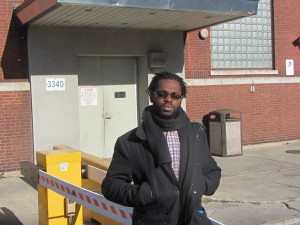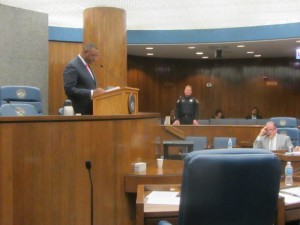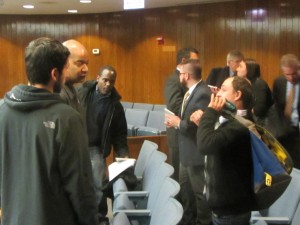Detainees: Lives changed after being held at Homan Square
Kevin Beese — December 22, 2015
Kory Wright stands in front of an entrance to the Chicago Police Department’s Homan Square facility. Wright, who has a clean record, said he was held at the facility for more than five hours of questioning on suspected heroin possession. That charge was later dismissed. Allegations have emerged that Chicago police use Homan Square to interrogate suspects and try to get them to become informants. (Photo by Kevin Beese/for Chronicle Media)
Kory Wright will never forget his 20th birthday.
He was on his aunt’s porch in the North Lawndale neighborhood getting his hair braided. Twenty minutes into the process, six Chicago police squad cars rolled up and officers stormed the residence.
Wright was one of four family members and friends handcuffed and taken into police custody in the June 2005 incident. He contends he wound up with both arms tied to a table and spent five or six hours held at Homan Square, alleged to be a Chicago police interrogation location compared by some to a CIA black site used to question terrorism suspects.
According to Wright, family members did not know where he was for hours as he was interrogated at Homan Square, which officially is an evidence storage and administrative facility located in an old Sears building in North Lawndale.
“I was a poor black kid. I did not know the law,” Wright said. “They gave me a paper saying I was indicted.”
The charge — possession of 30 grams of heroin with intent to deliver — had Wright, who has never been convicted of a crime, facing six to 30 years in prison. He said he opted for a bench trial and the judge dismissed the case quickly when a testifying officer pointed to an individual in the courtroom audience, not Wright, as the individual from whom an undercover officer bought heroin. Charges against the others were later vacated as well for improper arrest.
“Police said I did something I didn’t do,” Wright said.

Flint Taylor, an attorney with the People’s Law Office, talks to an individual after a Cook County hearing last week into Chicago police allegedly using the Homan Square site to interrogate suspects. Taylor said many clients have told him of being held at Homan Square for hours without access to an attorney. Police contend such allegations are false. (Photo by Kevin Beese/for Chronicle Media)
Wright told the Cook County Chronicle that he was planning to be a Chicago police officer, but the 2005 incident forever changed his perspective of law enforcement.
“I wanted to help,” Wright said. “I was going to be the guy from the neighborhood on the right side of the law. I saw myself being the officer who talked to the kid who threw a rock through a window instead of locking him up.”
Wright, finishing up graduate school, hopes to now be a computer network engineer.
Wright also told his story to members of the Cook County Human Rights Committee last week regarding alleged abuses at Homan Square. Although the county does not have jurisdiction over Chicago police matters, Cook County Commissioner Richard Boykin, chairman of the human rights panel, said the county should not be quiet about the issue.
“This body opened up information last year about stop and frisk procedures in the city of Chicago,” Boykin said, noting the county passed a resolution condemning the procedure and changes were made with the Chicago Police Department.
“Resolutions can be persuasive,” Boykin said. “I will continue to raise concerns. I will do all I can for our residents.”
The Chicago Police Department has stated that Homan Square is not a secret detention site.

Flint Taylor, an attorney with the People’s Law Office, talks to an individual after a Cook County hearing last week into Chicago police allegedly using the Homan Square site to interrogate suspects. Taylor said many clients have told him of being held at Homan Square for hours without access to an attorney. Police contend such allegations are false. (Photo by Kevin Beese/for Chronicle Media)
“We have been clear about this for many months,” Anthony Gugliemi, director of communications and news affairs for the Chicago Police Department, said in a statement to the Chronicle. “The allegations regarding Homan Square and CPD’s operations there are completely false, and even a number of independent experts and lawyers have discounted the claims.”
Boykin said the Chicago Police Department was invited to be part of last week’s hearing but declined to participate.
Marc Freeman said that Chicago police wearing ski masks and toting machine guns raided his apartment in October 2013 and accused him of selling drugs.
“They never read me my rights. They told me they were taking me to Homan Square,” Freeman said.
He said he continually asked for a lawyer, but that request was denied. He was offered the opportunity to become confidential information in exchange for charges being dropped against him, Freeman said.
“There is a double standard in Chicago,” Freeman said. “Citizens are held accountable if they break laws, but the police are not.”
Allegations about Homan Square recently surfaced in the England-based Guardian publication. The Guardian revealed that between August 2004 and 2015 more than 7,100 people were detained by police at Homan Square, many of them for hours upon hours.
Attorney Flint Taylor with The People’s Law Office in Chicago has handled police brutality cases since 1969. He said he first became aware of issues at Homan Square when Brian Church of the NATO 3 protesters in 2012 alleged he was tortured at the facility.
“He said he was held for 17 hours in a dark room,” Taylor said.

Marc Freeman (right) talks to individuals following his testimony during a county hearing about what he experienced at Homan Square while in Chicago police custody. (Photo by Kevin Beese/for Chronicle Media)
He said it is common for suspects to tell of being held for hours at the facility and for lawyers to not be able to get access to clients who are being held there. Taylor said he has heard stories of detainees being physically harmed and threatened at knifepoint to become police informants.
Taylor said plenty of documentation exists of police brutality during the past 15 years, including the torture tactics of former Chicago police Cmdr. Jon Burge.
“I think Homan Square would fit the criminal definition of torture,” Taylor said.
The county hearing on Homan Square got off to a shaky start, with some commissioners leery about taking on the topic and treading on Chicago’s jurisdiction.
Commissioner Deborah Sims said she would be more comfortable hearing that the State’s Attorney’s Office felt the county had the authority to address the city issue.
“I don’t want to be called before a federal grand jury over something I don’t know a lot about,” Sims said.
Commissioner Peter Silvestri said the county was treading on city territory by holding the hearing,
“If the City Council held a hearing about something we were doing, we would tell them to stay on their side of the building,” Silvestri said of the two governments that share 118 N. Clark St. “Are we going to hold hearings about how we should bomb ISIS? Are we going to hold hearings about how (state House Speaker Michael) Madigan and (Gov. Bruce) Rauner should get together and talk? We are getting into things we have no jurisdiction over.”



